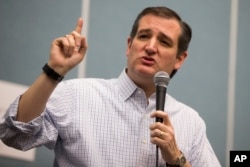With the Iowa caucuses only days away, polls indicate Texas Senator Ted Cruz and New York billionaire real estate developer Donald Trump are leading Republican contest.
As the first contest of the 2016 presidential election year, the Iowa polls with see both candidates depend on votes from evangelical Christians, who represented 57 percent of the Iowa Republican turnout in 2012 and between 50 and 70 percent of GOP voters in southern and central states holding contests in the weeks ahead.
Christian evangelicals in the United States say their religious beliefs heavily influence their political choices. Tina Marie, who spoke to VOA on her way to a church service in Conroe, Texas, put it this way: “As far as politics goes, I am not a big politicker [sic], but if God is not number one in the politician’s genre, then I have an issue with that.”
Such voters usually reject candidates who favor abortion rights, gay rights or anything threatening what they see as traditional religious values. But the Reverend Dave Welch, who heads the Houston Area Pastors’ Council, told VOA that voters need to balance those concerns against others like leadership ability and experience.
“One of the challenges for Christians, particularly, is having a high standard, having a biblical standard of who we choose, but not having such a perfectionist standard that it is unreasonable,” he said.
But Welch is troubled by evangelicals supporting twice-divorced billionaire Donald Trump, who owns casinos that include strip clubs. Welch is also bothered by Trump’s harsh rhetoric on immigration, including his plan to deport millions of undocumented workers.
“From a biblical viewpoint — from a compassion viewpoint — that is irresponsible and it is unworkable,” he said.
Trump’s appeal to Evangelicals
Yet some prominent evangelicals, such as Liberty University President Jerry Falwell, Jr. have endorsed Trump. Evangelical supporters say they favor him because he speaks clearly and directly about their concerns, despite his flaws.
Rice University political science professor Mark Jones said many of his supporters really don’t know much about Trump.
“The more information evangelical Christians get about Donald Trump, the less likely they are to support him," he said. "But there are going to be some who are going to be resistant to any information that contradicts their view that he is the one standing up for them.”
Jones contends that many Christian evangelicals in heartland states feel a bond with the New York billionaire because he expresses the anger and frustration they feel. He is also a celebrity, having made frequent television news appearances in recent decades, along with his popular reality TV show, "The Apprentice," that honed his image as a successful businessman who can get things done.
But Jones said when it comes time to vote, some evangelicals may pass on Trump and seek a candidate who better fits their criteria.
“Particularly in primaries and caucuses, evangelical Christians will go with the person who is both a social conservative, but also is in line with their views on economic issues and foreign policy issues,” he said.
Outsider candidates
The candidate most favored on that score is Cruz, a lifelong evangelical and an ideologically committed conservative who has riled opponents, including many prominent figures in his own party, with his tactics. Rev. Welch sees Cruz as a far better candidate for evangelical Christians than Trump.
“Ted Cruz is a solid, committed, dedicated follower of Jesus Christ; he is strong and has never wavered in his principles,” he said.
While dedicated conservatives admire Cruz, establishment Republicans see him as no better than Trump in terms of what they regard as harsh and reckless rhetoric. They are both mavericks appealing to voters’ desire for something different and, in that sense, Mark Jones and other political observers compare them to their ideological opposite, Democratic presidential candidate and Vermont Senator Bernie Sanders.
Polls show Cruz far ahead of the other GOP candidates who are regarded well by evangelicals, including Florida Senator Marco Rubio, Kentucky Senator Rand Paul, former Arkansas governor Mike Huckabee and retired brain surgeon Ben Carson.
Which candidate actually gets the most support from evangelicals will be measured in the results of Iowa’s caucuses on February 1, South Carolina’s primary on February 20, and primaries in several populous southern states, including Texas, Tennessee and Georgia on “Super Tuesday,” March 1.
